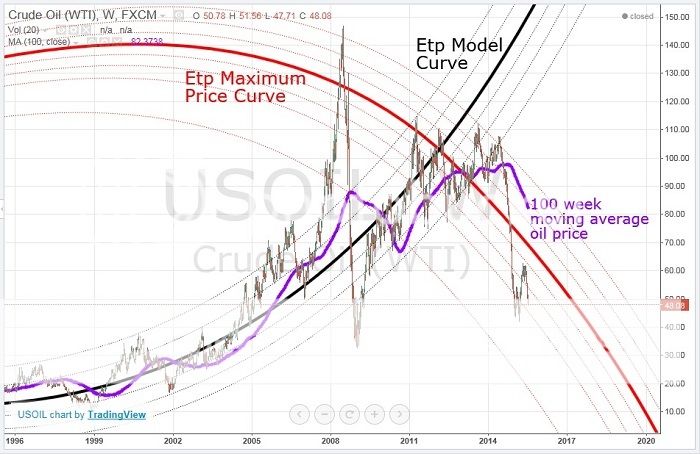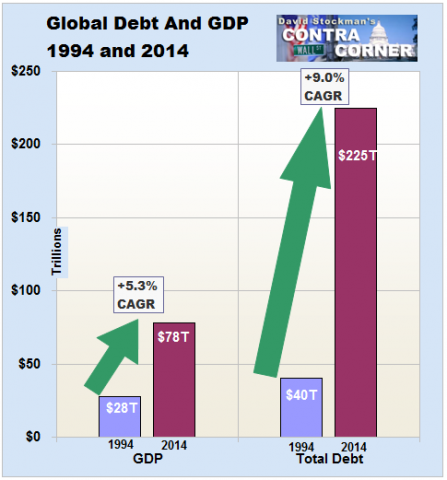Not an exact corellation of course, but they are related:. In this case, it was abandoned because people came to recognize it was wrong.
Peak oil theory is not wrong. It would still not be wrong even if
everybody thought it was wrong. Peak oil theory just says that oil production will eventually peak and then decline. Since the amount of oil in the earth is finite, this must be so.
Yes, that's what a paraphrase is.
Correct. You are now freely admitting that the words you were arguing against were, in fact, not mine. So, just like I said before, you are arguing with yourself, also known as creating a straw man. Most of your vexatious bullshit is based on this technique of deception.
[shrug] It's your article, not mine. I responded to what you gave me. It was written in 2012 at the latest and talks about a collapse soon. 2014 is my estimate of what it was intending.
Your
estimate of what it was intending? So 2014 was a another paraphrase?
Well, let's use this example to show how inaccurate your paraphrase construction typically is, shall we?:
In 2012, Korowicz said, "Secondly, from the manifest risk that we are at a peak in global oil production, and that affordable, real-time production will begin to decline in the next
few years". A few is generally accepted to mean 3 or more. You "paraphrased" it to mean 2. That is clearly wrong and intentionally misleading.
I know: It is lacking in specifics. I already told you that is one of the problems with it!
I only presented a simple paragraph for you to respond to. Not the whole paper.
No, I'm not: We're discussing only that quote. There was definitely a worse collapse called The Great Depression and arguably one or two others in between.
Okay, so now we are discussing only that quote I asked you about? You keep switching back and forth. It is hard to tell since you are usually "paraphrasing".
The price of oil is supporting fracking now. Geopolotics makes it difficult to predict when it will rise more in the future, but the outside guess is that it is unlikely to be more than 5 years before the loss of revenue leads the OPEC nations to change their tactics.
The price of oil is well below the cost of production for most fracking.
Typical. When backed into a corner with detailed replies to your bad arguments, you dodge them until they drop to the previous page and then claim it is too much of a burden to flip back one page to get back to it. Do you really not see how you appear to others?
You are now trying to accuse me of doing the very dirty trick that you do on every page. Amazing. Obviously, you are the one who doesn't give a shit about how you appear to others.
I'll repost it for you to respond to, to save you the effort of clicking an additional one button...
Thanks, I guess.
....actually, it was #1393 that you ignored when you rebooted:
So you were actually directing me to the wrong post to waste my time answering? Great.
Duh indeed. The two statements aren't saying the same thing, so you're tying yourself in a knot trying to weasel out of an utterly stupid statement -- the second is closer to true, but still false: The first says "the energy delivered to the end consumer is declining" (it isn't: it is increasing) whereas the second says "all of the increase is consumed...." which even if true would be a net steady production, not a decrease. Maybe you do know what you are saying is BS afterall?
Of course, if you do know what you are saying is BS, you know you've added some BS since "production" doesn't include the oil burned by the oil industry, it only includes the oil delivered to consumers....which, yes, is increasing in volume and steady in its energy content.
Um...I have no idea what the hell you are talking about. All you do is play word games. Here is the complete original statement by BWHill that got all this started:
The 2012 energy half way point initiated a major change in the petroleum production function. It began a process where the end consumer was no longer able to acquire all the petroleum that the industry produced. More of the energy from petroleum was being committed to the production of petroleum than was being delivered to the consumer. This precipitated the 2014 price decline that reduced prices by 50%. The energy delivered to the end consumer will continue to decline, and the end consumer maximum affordability will decline with it. It will be necessary for the industry to reduce production to compensate. The highest cost production fields will continually be shut in as the price falls below their operating minimum.
~BWHill
Do you understand what he is saying? If so, do you disagree? If so, can you explain why?
I said gas instead of oil. My bad and I'm sure you know that was a basic error. Doesn't make your false claims about the price of oil any less false.
Too vague to answer. What false claims? Are you sure you're not "paraphrasing" again?
You've admitted it previously - and how could you not, since you are claiming exactly the opposite mechanism from you were claiming before.
More "paraphrasing".
Heck, it's obvious enough since you don't mention Peak Oil anymore.
You keep making shit up, Russ. I never stopped mentioning peak oil.
You're using a 100 week moving average (spans two years!) and even then your "well below" is about $97!
So you think this graph shows that oil averaged about 97 dollars a barrel during the period of 2011-2014? Really?
As can be clearly seen, at the beginning of 2001, the 100 day moving average was under 75 dollars a barrel. It maxed out at about 98 dollars after June of 2014. That can not possibly yield an average of about 97 dollars as you so errantly claim. I think the average is probably closer to 90, maybe 92. But that is all beside the point.
The point is that oil over 100 dollars a barrel is not normal. It was an unusual event that will not be repeated. The economy cannot "easily handle" oil over 100 dollars a barrel.
Since you ignored the bit about inflation (oil was, in fact, over $100 a barrel adjusted for inflation for about a year around 1981), I'll take that as an admission that you are aware that you are full of shit.
Adjusting for inflation is bullshit in this case, Russ. If you want to seriously claim that the oil price was higher in 1979 than it was in 2008, go ahead.
So, what do you think of the fact that the median American is a whopping 300% richer today than in 1980?
I think it is false, misleading, and irrelevant.
No doubt, you are going to say that oil prices are currently too low to support fracking,...
Yes. Since it is true, that is what I say.
...so I'll let you pick the price and I'll expand on the future prospects for reaching it.
Thanks. West Texas Intermediate Crude is currently 43.70 a barrel.
When do you expect it to reach 50 dollars a barrel?
When do you expect it to reach 60 dollars a barrel?
When do you expect it to reach 70 dollars a barrel?
When do you expect it to reach 80 dollars a barrel?
When do you expect it to reach 90 dollars a barrel?
When do you expect it to reach 100 dollars a barrel?
Just make sure you are aware that you are also arguing the opposite thing about oil prices in the 2000s. You can't claim that oil prices were "well under" 100inthe2000sandthenclaimthat'>100inthe2000sandthenclaimthat100inthe2000sandthenclaimthat 100 in the 2000s and then claim that 100 is required to support fracking. You can't have it both ways: it's a specific self-contradiction.
More unintelligible, vexatious, paraphrasing, squirming, dodging bullshit by Russ_Watters.
---Futilitist




